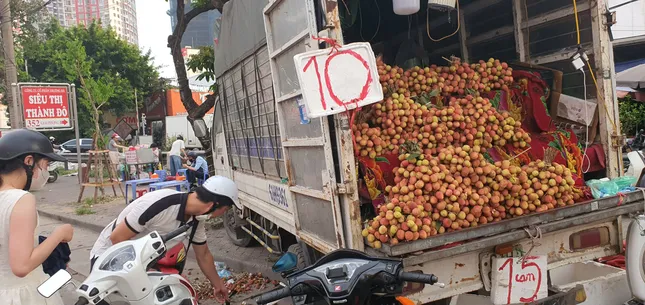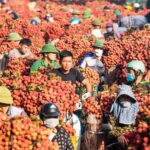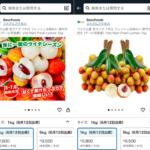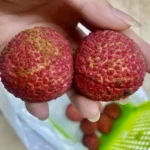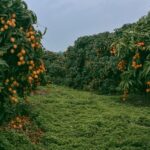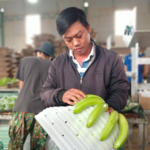
Young people choosing the first summer lychees.
Summer is here, and with it comes the delicious lychees. Their crimson clusters hang heavy in the morning sun, each fruit glistening like a drop of sunshine, perfectly ripe.
Lychees from the countryside arrive in the city
What surprises me is that these early-season lychees are so affordable, at only 20,000 VND per kilo. The seller is a cheerful country girl with a ready smile, inviting customers to try her delicious lychees. Perhaps because it’s a bountiful harvest, she doesn’t add any extra branches or leaves to increase the weight—an honest practice that reflects her sincere character.
As people leave work, the sidewalk along Giai Phong Street becomes more crowded. Many stop to buy a few clusters of lychees to take home. For just a few dollars, they can bring a taste of the countryside and the sweetness of summer into their homes. I, too, am drawn to these lychees, selecting a fresh cluster as a way to honor the new season.
In the following days, more and more lychee vendors appear along the same street, their carts stretching out further and further. The lychees are now at their peak, sweeter and more consistent in size than the early-season fruit. And amazingly, the price has dropped even further, now at only 15,000 VND and then 10,000 VND per kilo. The carts empty quickly, but there always seems to be another one ready to take its place. The capital city is alive with the excitement of lychee season, and these delicious fruits are more affordable than even the cheapest vegetables.
As I eat these juicy lychees, my heart aches for the hardworking farmers who toil under the sun and in the rain, eagerly awaiting each harvest season. Yet, when the harvest is abundant, prices drop, and when the harvest is scarce, they are left with nothing. This vicious cycle seems to be the fate of many quiet lives tied to the land.
But there is hope. One day, Vietnamese lychees will travel far and wide, reaching markets in Japan, the US, and Europe, becoming a prized delicacy and a source of national pride for our agricultural industry.
As I savor the sweetness of these lychees, my mind drifts back to summers long ago, when I was a child playing in my hometown. I remember the scorching hot afternoons, when, after a quick lunch under the porch, I would climb up the old lychee tree by my grandmother’s pond. There, I would pluck the bright red lychees, like heavenly gems, dripping with sweetness. These lychees were of the finest variety, with tiny seeds, thick flesh, and a thin, silky skin that carried the warmth of the morning sun and the morning dew.
The sounds of birds chirping in the branches, the buzzing of cicadas weaving a lullaby for the summer noon, my mother’s voice calling me home for dinner, and the laughter of children playing in the wind—all of these weave together into a tapestry of sunny memories, soft and filled with love.
That summer, my older cousin ate so many lychees that he broke out in a red rash on his back—a sweet souvenir of a simple and fulfilling childhood, forever marked on his skin.
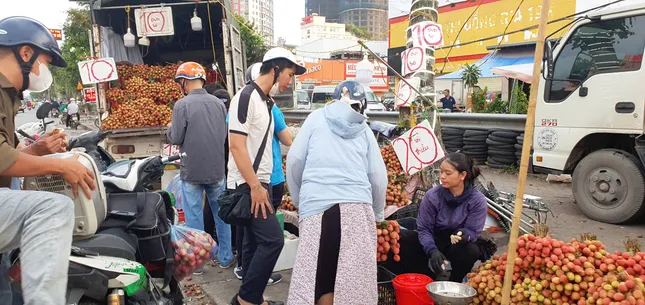
“Lychee market” on Giai Phong Street, Hanoi. Photo by Nguyen Tuan.
Each cluster of lychees represents a brand
A few days ago, my colleague received a wedding invitation from a younger coworker. We were all surprised, as the groom-to-be is almost 40 years old—a late age for marriage in our culture. Everyone teased him good-naturedly and asked about his bride-to-be. It turns out that she’s from Hai Duong, the same province as my grandmother’s hometown, which is now part of Hai Phong. This region is known for its lush, fertile land, and it’s just a stone’s throw away from Thanh Ha, the so-called “capital of lychees” in Northern Vietnam.
With pride in his voice, he told us about his hometown and its long history of lychee cultivation, including the ancient lychee trees in his family’s garden, which bear fruit every year. He then invited us with a laugh: “Come to my wedding and then visit my lychee garden! The lychees are ripe and sweet! It’s not just a wedding; it’s a lychee season experience!”
This invitation, though lighthearted, is a beautiful expression of his love for his homeland. It’s a form of soft marketing, showcasing the sincerity and warmth of the people from the Northern Delta.
In that moment, I realized that if everyone could speak about their hometown with such gentle pride, and if each fruit harvest became a reason to welcome guests, then farming could become a form of tourism and a way to build a brand. No grand campaigns or stages are needed—just a love for one’s homeland and a few sincere words, and people will be drawn to visit.
Eating lychees reminds me of the Secretary of the Provincial Party Committee of Hung Yen. Every lychee season, despite his busy schedule, he takes the time to select the most beautiful clusters of lychees—the Phu Cu red egg lychees, with their large, egg-like fruits and thick, sweet flesh—to send to journalists and close friends in the capital.
As a journalist, I have spent many years documenting the sweet harvests, bustling markets, and busy people of this country. Standing in the markets of Thanh Ha, Luc Ngan, or the ferry pier in Hung Yen, I’ve witnessed the tireless lychee sellers, their hands rough from hard work, carefully handling each cluster of lychees. I know that behind each lychee is a ray of sunshine and a human story.
This lychee season, like every other, brings with it the sweetness of the fruit and the smiles of the sellers. But it also brings the worry of making a living.
While the agricultural sector has made efforts to promote consumption and connect farmers with supermarkets, e-commerce platforms, and export markets in Japan, the US, and China, many farmers still have to bring their produce to the city themselves, quietly struggling to sell their goods on street corners.
The issue of “rescuing” agricultural products is not new, but each harvest season serves as a reminder of the need to find a solution. How can we ensure that farmers no longer have to depend on the whims of the market or the mercy of the weather?
And if no one tells their stories or preserves their memories, these sweet seasons will pass by, leaving no trace behind.
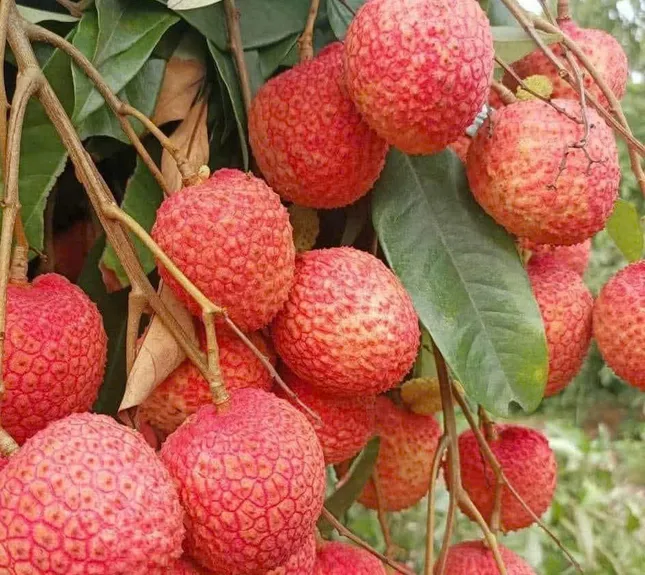
Hung Yen’s red egg lychees are famous for their delicious taste.
Hung Yen’s Red Egg Lychees
As I eat these lychees, I think of the Secretary of the Provincial Party Committee of Hung Yen, who, after a merger, now holds the same position in a province that stretches to the shores of Thai Binh. And the people of Thai Binh can now proudly claim Hung Yen’s lychees, longan, and bánh cáy (a traditional cake) as their own, along with the beautiful beaches of Dong Chau.
Every lychee season, despite his busy schedule, the Secretary takes the time to select the most beautiful clusters of red egg lychees from Phu Cu, with their large, egg-like fruits and thick, sweet flesh, to send to journalists and close friends in the capital.
Perhaps these lychees are a way of expressing his friendship and a unique “specialty” of his leadership—a way to introduce the people of the capital to the true taste and sincere warmth of his province.
And so, one day, Vietnamese lychees will not only brighten the streets of Hanoi but will also travel far and wide, reaching markets in Japan, the US, and Europe, becoming a prized delicacy and a source of national pride for our agricultural industry.
May the fragrance of lychees not only sweeten our summers but also spread the warmth of our homeland across the globe.
Vietnamese Luc Ngan Lychee Sold on Amazon Japan for Half a Million Dong per Kilogram
The luscious Vietnamese lychees are now available on Amazon Japan, retailing at an extravagant price of VND 508,000 per kilogram.
Luscious Chinese Liichi Floods Vietnamese Markets: Unbelievable Price Surge
In the midst of the peak season for Bac Giang and Hai Duong lychees, a new variety of lychee from China has unexpectedly entered the market, creating a secret frenzy with its exorbitant price of up to 700,000 VND per kilogram. Dubbed as “crystals from Yunnan” by sellers, these imported lychees are a unique addition to the local fruit scene.
The Joy of Labor: A Photo Essay on the Harvesting of Lychees
The lychee season has arrived, and the entire Phuc Hoa region is buzzing with excitement and awash with vibrant red hues. From the early morning hours, the locals are hard at work, meticulously gathering the luscious clusters of fruit that are the culmination of a year’s worth of diligent care and dedication.
The Cry of ‘Boss’ Duc: “Finding a Farm Manager is Harder than Finding a Bank Boss” – Unveiling the Thirst for Agricultural Talent
Finding a bank or securities company director in Ho Chi Minh City is a walk in the park. But finding a farm director is an incredibly challenging task. The perfect candidate needs to possess not only the required expertise but also the willingness to sacrifice by living in remote and rural areas.

